[music:] Maurizio Monti, Diavolo custode (1976)
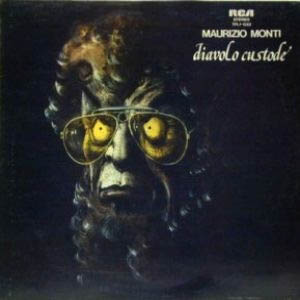
Promise is debt. So here comes the long-time lost second solo album by Maurizio Monti, Diavolo custode (“guardian devil”).
For those who fell in love with his debut full-length, L’amore (posted here some time ago), this one could be a slightly different experience. Monti embraces a much more twisted songwriting here, with such negative, cynical and hopelessly ironic lyrics that he seems possessed by Mauro Pelosi‘s evil spirit; and while L’amore‘s signature sound was that of both acoustic and electric piano, most of the tracks in Diavolo custode are built around guitars (Adriano Monteduro is credited in the backing band, which also counts Paolo Rustichelli on keyboards, Carlo Bordini on drums and Glauco Borrelli on bass).
The subtly unconventional arrangements are by Monti himself together with Paolo Dossena – who’s in charge of the production as well – featuring staggering ambience shifts, breathtaking groove breaks (such as the coda to “La tessera del tram”, which people like Air would willingly give a couple of kidneys for) and also Italian folk hints, especially when the rythm section takes a marching band pace, like in “Ruote” or “Cuore di rosa”.
Here is the tracklist:
01, Io e la bambina (“me and the baby girl”)
02, Piccolo animale (“little animal”)
03, Ruote (“wheels”)
04, Cuore di rosa (“heart of rose”)
05, Rosmarino (“rosemary”)
06, Povero idiota (“poor idiot”)
07, La tessera del tram (“the tram pass”)
08, Il diavolo (“the devil”)
Get it: Maurizio Monti, Diavolo custode (1976)
You can also check out his MySpace tribute page, mantained by his daughter Nina.
[music:] Gustoforte, Gustoforte (1985)
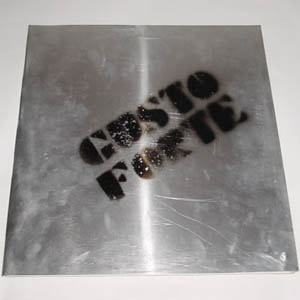
A sonic guerrilla squad featuring videomaker Roberto Giannotti (vocals, drums, keyboards, tapes), Stefano Galderisi (basses, keyboards, tapes – formerly of surf-rockers The Sentinels), Il Maestro (“the master”, later identified as the singer-songwriter Francesco Verdinelli, on guitars, keyboards and tapes) and La Donna (“the woman”, possibly actress and scriptwriter Roberta Lerici, on vocals, drum machine, percussions, tapes) started the band called Gustoforte (“strong taste”) in Rome in 1984.
This self-titled album released by Rat Race label early in 1985 with liner notes by Ado Scaini of The Great Complotto fame, which in the first 200-copies run came in a real steel cover, remains unfortunately the only evidence they left behind – a stunning, savage post-everything epic which each time brings to mind Virgin Prunes at their most demented and free-form, This Heat, The Residents, or even Claudio Rocchi’s attempts in electronics, and clangs in unison with the noises of contemporary experimental rock outfits such as, just to name one, Black Dice, or catastrophic dub suppliers of Excepter’s caliber.
The record follows the storyline suggested by an anti-utopian sci-fi plot, just like in an old-fashioned concept album: a travelling salesman visits a factory just to discover that there’s only one human worker left, contently attending 24/7 a useless assembly line, with all the time in the world to think. A robot escorting the representative in a tour of the plant explains him that unreliable workers have been completely replaced with machines. The only other humans around are dismissed trade unionists, just sitting around in a room, drinking and recalling the old days. The rep is then introduced to the factory coordinator: a powerful female supercomputer who manages to seduce him and eventually turn him into a bionic salesman working for the company.
Here is the tracklist:
01, s. Antony Chain
02, Steel Walk
03, Ventiquattro tre 84 (“twenty-four three 84”)
04, Assembly Line
05, Evry Courcouronnes
06, Factory ab absurdo
07, Ask Me Dream
08, Bionic Promotion Agent
Get it: Gustoforte, Gustoforte (1985)
Gustoforte reportedly recorded an unreleased second album, called Souvenir of Rome, before Giannotti and Verdinelli quit the band in 1994. Drummer Franco Calbi, performer Domenico Vitucci and Texan avant multi-instrumentalist and self-made instruments wizard Chris Blazen were recruited by the end of Nineties by Galderisi to keep the project alive. Anyway, the current line-up credited in their basic MySpace page features only the four original members.
[music:] Gianni Morandi, Il mondo di frutta candita (1975)
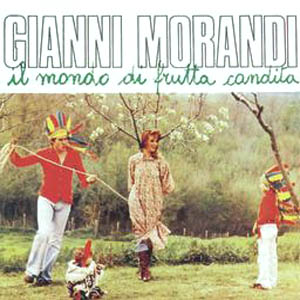
A kind of an identity disorder struck most of the Sixties’ teenage monstre popstars once entered the following decade, forced to face the evolution in young people’s music taste and the rise of rock bands, progressive, and cantautori.
Caught in this middle-age crisis, in the early Seventies Gianni Morandi was staggering between faint attempts to sound a bit more updated in music and engaged in lyrics, badly reviewed experiments in theatre and musicals, and fruitless efforts to win back his past success, when he decided to record a song written by Oscar Prudente and Mogol and already released as a single by Prudente in 1971: “Il mondo di frutta candita” (“the candied fruit world”), and everything suddenly seemed to fall in its place. An entire new album was built around this track, featuring the same Prudente and the young Ivano Fossati as songwriters.
You can feel his excitement and his trust and commitment in the project by the way he took over the songs with a yet unheard hoarse and almost raging voice, blessing overlooked jewels such as “Autostrade, no!”, “Io vado a sud” or “Io domani me ne vado” (just listen to this last one, and then consider that “Amarsi un po'” by Lucio Battisti will come two years later, in 1977). A promotional movie was also shot in the States to help launching the record (watch an excerpt here). And, guess what? Il mondo di frutta candita came basically unnoticed, worsening his crisis with the most bitter disappointment.
Here is the tracklist:
01, La caccia al bisonte (“the buffalo hunt”)
02, Sette di sera (“seven in the evening”)
03, Autostrade, no! (“highways, no!”)
04, Favole di mare (“sea fables”)
05, Il mondo di frutta candita (“the candied fruit world” also released as a 7″ b/w “La caccia al bisonte”)
06, Io vado a sud (“i’m going south”)
07, Due ore di polvere (“two hours of dust”)
08, Io domani me ne vado (“tomorrow i’m going away”)
09, La mia gente (“my people”)
Get it: Gianni Morandi, Il mondo di frutta candita (1975)
Anyway, this sad story came to a happy ending: after a three-years retirement from the music business, during which he studied double bass at Santa Cecilia conservatory in Rome, Gianni Morandi managed to hit the charts again in 1980, just to stay there.
He has released more than thirty albums to date, and is still one of the most popular pop singer in Italy. You can find more info on his official site MorandiMania (in Italian).
[music:] Gaetano Liguori Idea Trio, I signori della guerra (1975)
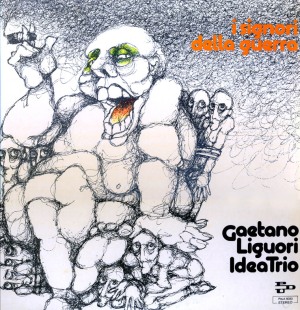
Back in the Seventies the existence – and the significance – of a politically engaged, militant jazz could have been pretty obvious in the States, or Africa, or elsewhere outside Italy, but certainly not here, where traditionalist and stiff connoisseurs audiences regarded it rather as a wicked contamination with earthly matters.
Gaetano Liguori – a classicaly trained pianist and composer – was among the first italian jazz musicians to address directly “the heavy human condition of destitutes, deviants and oppressed people at every latitude”, as this record’s liner notes read, bringing jazz to the revolutionary masses by playing thousands of gigs at factories, schools, universities, squatted places and pop festivals.
I signori della guerra (“the lords of war”), credited to his Idea Trio, came after their controversial debut album Cile libero, Cile rosso (“free Chile, red Chile”), and kept on the same path, combining free outbursts with quieter and atmospheric piano tunes and folk hints. The combo featured Filippo Monico on drums and Roberto Del Piano on bass.
Here is the tracklist:
01, I signori della guerra
02, Garabongo
03, Don Mario blues (“father Mario blues”)
04, Tarantella del vibrione (“vibrio’s tarantella” – in 1973 a huge cholera epidemic hit Naples and other cities in Southern Italy, but the track is actually dedicated to Roberto Franceschi, a 21-year old student shot dead by the police in Milan during a demonstration on January 23rd, 1973)
05, Inco
06, Viva la Cassa del Mezzogiorno (“up with the Cassa del Mezzogiorno” – Cassa del Mezzogiorno, “Mezzogiorno’s bank”, was a publicly held bank established in the Seventies to finance development projects in Southern Italy, soon infiltrated by mobsters)
Get it: Gaetano Liguori Idea Trio, I signori della guerra (1975)
In 1976 Liguori recorded, together with the poet-worker Giulio Stocchi, Demetrio Stratos, his father Pasquale Liguori on drums and some other fellow musicians La cantata rossa per Tall El Zataar (“the red cantata for Tall El Zaatar”), which recalled the huge massacre of Palestinian refugees by the hand of christian phalangists happened in Eastern Beirut earlier that year.
A version of “Tarantella del vibrione” featuring Tullio De Piscopo on drums and recorded at the Demetrio Stratos’ tribute concert in Milan, June 6th, 1979, is available in the legendary 1979 il concerto Cramps live album.
He is still active as a composer and performer. You can learn more about his past and current work at his official website (in italian only).
[television:] Flavio Giurato, “Mister Fantasy” (1984)
Ok, I’ve come to terms with the fact that – for a while, at least – I will likely not be able to provide the blog with such extended and detailed posts as I used to. And I know too well this will dramatically debase the very reason to be of this page: I remember starting “Anni di piombo, anni di paillettes” having clear in my mind that another download links warehouse like millions out there would have been meaningless. Fact is, I’ve grown affectionate with this place, you know, and I hate disappointing the hundreds of people who still pay a visit daily and those who request records.
That’s why I will keep on supplying music links anyway, with just few basic info, along with some precious guest contributions.
Just for a start, here is a rare and unexpectedly resurfaced footage originally from the tv show Mister Fantasy featuring “Marco e Monica” by Flavio Giurato, an excerpt from his Marco Polo album posted here some time ago.
[music:] Carmelo Bene, Lectura Dantis (1981)
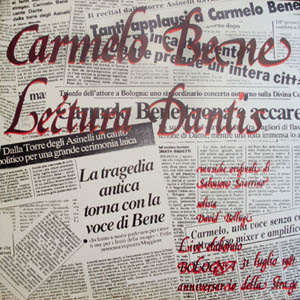
Do I really have to explain who Carmelo Bene – or C.B., as his friend Gilles Deleuze used to refer to him in his writings – was? A performer, theatre and cinema experimenter, philosopher, criminal, professional provocateur, he’s been one of the most controversial yet influential Italian artists in the past century. Try reading his obituary on The Guardian or his Wikipedia page (in italian) for a glimpse of his life and work.
On August 2nd, 1980, an infamous fascist bomb attack at the train station in Bologna killed 85 people and injured more than 200. Perhaps the most sensational act in the Strategy of tension, gone down in history as “strage di Bologna” (“Bologna massacre”). One year later, on 31st July, 1981, Carmelo Bene delivered a public reading with selected cantos of the Divine Comedy to an audience of more than 100.000 people from the Torre degli Asinelli, one of Bologna’s main monuments and the tallest medieval tower in Italy, to commemorate the first anniversary of the bombing.
Pursuing his lifetime goal of establishing theatre as an acte vide, Carmelo was then perfecting his mutation into a “macchina attoriale” (“acting machine”), completely uprooting the voice from the body that produces it and magnifying it through heavy amplification, mixing and electronic processing, so that the obtrusive speaking subject is replaced by a device in which the actor and the equipment can’t be separated.
This process had begun with his magnificent Manfred after Byron/Schumann, first staged at La Scala in Milan in 1979, but the outdoor Bologna performance gave him the opportunity to have a powerful rock concert set up to experiment with. Reading from a tower’s window, virtually invisible to the audience, he appeared as a sheer sound presence, an air sculptor shaping the space. And, yeah, this is music to me. (Ok, the record actually includes some short entr’actes by sicilian contemporary classic composer Salvatore Sciarrino, but the real score here are Dante’s lines, while the voice of Carmelo rules as the the most versatile instrument.)
Here is the tracklist:
Inferno (“hell”)
01, Canto V (“5th canto”)
02, Canto XXVI (“26th canto”)
03, Canto XXXIII (“33rd canto”)
Purgatorio (“purgatory”)
04, Canto VI (6th canto”)
05, Canto VIII (8th canto”)
Paradiso (“paradise”)
06, Canto XXIII (“23rd canto”)
07, Canto XXVII (“27th canto”)
08, Canto VII (“7th canto”)
09, Sonetti (“sonnets”)
Get it: Carmelo Bene, Lectura Dantis (1981)
The immortal words that Carmelo pronounces at the end of the last track are: “Io mi scuso per il vento che ha turbato questa dizione, questo canto e, sebbene ringrazi gli astanti, ricordo un po’ a tutti che ho dedicato questa mia serata, da ferito a morte, non ai morti, ma ai feriti dell’orrenda strage” (“i apologize for the wind which troubled this reading, this chant, and although thanking the people in the audience, i would remember to everybody that i dedicated this night of mine, as someone wounded to death, not to the dead, but to those injured by the dreadful massacre”).
He eventually died in 2002, at the age of 64.
Two neofascists, Giusva Fioravanti and Francesca Mambro, members of the NAR (a right-wing terrorist group) have been sentenced for life in 1995 as the executors of the attack, while other people – including several former secret service officers and directors – have been found guilty of aid and abet. All of them still claim their innocence.
[music:] Anna Arazzini, Vola, vola in alto amore mio (1970)

Fabio Carboni from Die Schachtel lended me this album in a plain yet beautiful gatefold die-cut cover some time ago, saying something like: “it’s quite an interesting record, but there’s actually just one song which is worth the listening”. Oh, boy. Fabio, you definitely must have picky tastes – or maybe you were just kidding me. I brought it home, and I played it. Once and then again. And again. I was thunder-struck.
Is this an art pop female singer/songwriter? In 1970? Is she the same girl who wrote some songs for the popstar Iva Zanicchi? And that sitar-driven track? There are several reasons because Vola, vola in alto amore mio (“fly, fly high my love”, a line from “Se mi vuoi”) is astonishing. The most striking is perhaps its spectacular lack of impact on the early seventies Italian music scene, its being in vain, a grand miss; it’s like if the record, and Anna herself, imploded somewhere in outer space instead of burning like a bright sun at the centre of the star system as it, and she, should have done, undeterredly continuing to vanish for almost forty years.
Then come, of course, its strictly musical qualitites, such as the excellent songwriting (all tracks are credited to Arazzini and the producer Ezio Leoni), which spans classic ballads and torch songs, rarefied jazz, bloodless soul, bossa, Italian folk and world music (such as in the klezmer-like “Ballata di una bimba”) and seems not completely unaware of the recent achievements by Fairport Convention and Pentangle, Joni Mitchell, or Jefferson Airplane at their folkiest, while the lyrics astoundedly record in ecstatic surrender the beauty and pain of nature and love. Or the magnificent, ethereal and roomy arrangements by Enrico Intra, which shake and break their Morriconian mould by dint of insisting on the darkest and most troubled zones, eventually gracing the record with a pervading imaginary soundtrack mood (by the way, in 1969 Anna had performed the song “Un posto per un addio” – “a place for a farewell” – for the Piero Umiliani’s score to La morte bussa due volte by Harald Philipp – international title: Death knocks twice).
And, above all, the depth and intensity of her performance: starting from the positions of Mina or Patty Pravo she comes to expressive solutions and emotional lands that Italian female musicians such as Giuni Russo and Alice would have rediscovered after ages (try listen to “Quanti anni, ragazzo” or “Il mare è tranquillo”), approaching priestesses like Sandy Denny or Beth Gibbons (“Palden”, for instance, would have easily fit in the latter’s masterpiece with Rustin’ Man Out of Season).
Here is the tracklist:
01, Tu non sei più innamorato di me (“you’re no longer in love with me”)
02, Quanti anni, ragazzo (“how many years, boy”)
03, Sveglierai la luna (“you will wake up the moon”)
04, Sarà Emanuela (“it will be Emanuela” also released as a 7″ b/w “Lontano dall’inverno” – “far from winter” – in 1969)
05, Ballata di una bimba (“ballad of a baby girl”)
06, Come il vento notturno (“like the night wind”)
07, Se mi vuoi (“if you want me” also released as a 7″ b/w “Tu non sei più innamorato di me”)
08, Il mare è tranquillo (“the sea is still”)
09, Palden
10, Elegia (“elegy”)
11, Oggi il sole è il re (“today the sun is the king”)
12, Una volta (“once”)
Get it: Anna Arazzini, Vola, vola in alto amore mio (1970)
After this largely unnoticed exploit, Anna Arazzini went on working as a theatrical actress, mostly in musicals, before vanishing without a trace in the late eighties. You can see and hear her in an excerpt from the original 1980 staging of Tito Schipa jr.’s Er Dompasquale after the Don Pasquale by Donizetti, in which she played the role of Norina.
[television:] The Great Complotto, “Mister Fantasy” (1981)
Here’s a tiny excerpt from the 18-minute tv special dedicated to the Great Complotto by Mister Fantasy, a tv show pioneering post-modern aestethic and the fine art of music videos in Italian television when “MTV” was just a meaningless abbreviation to us, hosted by Carlo Massarini and broadcasted by RAI from 1981 to 1984.
The bearded guy you may see opening the door of the Complotto’s “General bureau” at the beginning of the clip, just to disclose the movement’s general staff frozen in funny poses, and then closing it back, is a young Roberto D’Agostino, now a well-known journalist and gossip guru, owner of the popular yet dreaded Dagospia website.
The song is “Stimolation” by Fhedolts.
[requests, music:] AA. VV., Pordenone/The Great Complotto (1980)
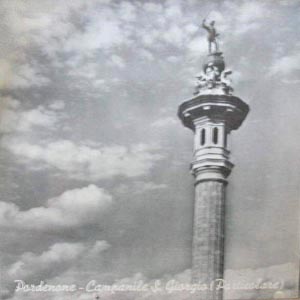
The sleep of province produces monsters.
As repeatedly requested, here’s the manifesto of the Great Complotto (“grande conspiracy”), or: how a handful of kids from Pordenone, a well-off, outlying small town in Friuli-Venezia Giulia, North-East Italy, turned their city into the imaginary state of Naon (a republic with its own flag, money, government, football team, customs and habits – an official guide was included in the 1983 IV3SCR compilation) and managed to make it one of the capitals of international situationism and the cradle of Italian punk beside Milan, Bologna, Turin, Florence. Featuring bleeps, noises, screechings, drones, the legendary London performance by Tampax and HitlerSS – when they sent fake tour dates to “Time Out” and then went to the scheduled locations with cardboard instruments just to see what their audience could look like – and the Naon national anthem “Atoms for energy” in two different versions.
And remember: Pordenone could be London, but London can’t be Pordenone.
Here is the tracklist:
Lato A (“A side”)
01, Mess, Paraguay
02, Fhedolts, Stimolation
03, Sexy Angels, La beat
04, Andy Warhol Banana Technicolor, I’m in love with my computer
05, Mind Invaders, Individual therapy
06, 001100111100011001011101 (Cancer), 000010
07, 001100111100011001011101 (Cancer), 000001
08, Musique Mecanique, Atoms for energy
09, Musique Mecanique, Good ideas must not fall in the hands of the enemy
10, Tampax/HitlerSS, London cartoon concert
Lato I (“I side”)
11, Fhedolts, Hearthing
12, Andy Warhol Banana Technicolor, The future
13, Mess, Foolish girls
14, W.K.W., Wyatt Earp
15, Sexy Angels, Atoms for energy
16, Little Chemists, Fe2Cr 0
17, Waalt Diisneey prod., Chips dorè (I.D.Y.)
18, Waalt Diisneey prod., (I need) Action
Get it: AA. VV., Pordenone/The Great Complotto (1980)
[edit August 23rd, 2009: the all-worthy publishing house Shake Edizioni has at last made available again this record on cd, added with extra tracks, a video and a 68-pages book stuffed with pics and lyrics! Useless to say, the download link has been removed. You can get the box here.]
The album was produced by The Great Complotto, Oderso Rubini, Red Ronnie, Ado (Scaini, from Tampax) and Compact Cassette Records, and released through Italian Records Service. The cover features a postcard of Pordenone. Among the several outfits involved in the movement you can also count Futuritmi, Ice & The Iced and the amazing XX Century Zorro.
Everything you may need to know about the Complotto is here on its official website mantained by StEvE (unfortunately, in Italian only).
[guests, music:] Enzo Maolucci, L’industria dell’obbligo (1976)
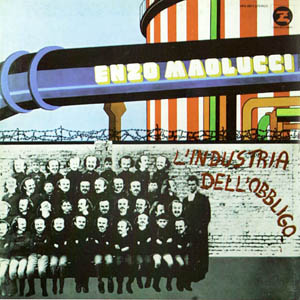
Renato Q., among a bunch of other things we won’t mention here, is currently the lyricist for the lo-res brain-pop sensation Humpty Dumpty (make sure to check out their blog and enjoy the freely downloadable Q.b., or even better, buy the cd).
As a conscious and judgmental citizen of Turin, he dramatically helped us in diggin’ up the debut album by Enzo Maolucci, one of the signature singer/songwriters in town in the late seventies and early eighties, who provided with his records a kind of a loath soundtrack to those city’s difficult years.
The Italian version of the post by Renato is available in our Found in translation page.
“Da un mese sto insegnando in una scuola media” (“it’s been a month i’ve been teaching at a middle school”). Enzo Maolucci’s debut album opens with a declaration of double identity: here is a rock musician who is also a new teacher in a public school. Two conditions which aren’t necessarily consistent; and it’s easy to see that Maolucci doesn’t feel that comfortable in his role as a professor just looking at the cover, where he shows his face in a close-up, but prefers identifying with those who are on the other side, with the students: inattentive, mocking students, positively devoted to disobedience.
At the back there’s a wall, on top of the wall there’s barbed wire, and beyond the wall a town, Turin, for which this record nearly marks an official breakthrough in Italian rock imagination. Turin is the Detroit of Italy, the factory-city ruled by Fiat, a town where the same air is full of things that this record tends to deal little with, possibly for the same reason a fish would hardly write a song about the water it swims in. In the most tough Turin of the seventies, didactic songs about workers and assembly lines are willingly left to write to foreigner, to tourists, such as Lucio Dalla from Bologna, for instance, who exactly in 1976 has released an album, Automobili, whose opening track is an imaginary “Intervista con l’Avvocato” (“interview with the lawyer”, being “the Lawyer” the nickname of Gianni Agnelli, the president of Fiat). For Maolucci, the city is the backdrop for an autobiographical eye, which soon becomes his easily recognizable signature style: his approach may appear less direct, but it’s just because the power – the power of the “padroni” (the “masters”) – is there to be met and challenged everywhere, in café speeches, in the cultural institutions, in everyday life.
The first two stories are named after two proper nouns: Baradel and Rita Fenu, one a surname from Veneto, and the other from Sardinia; two characters who refer to the migration wave that brought to Turin something like a half-million people during the previous twenty years. People who can’t cope, who have a hard time at school, who face home violence day by day. Rita Fenu is a young mother forced several times to clandestine abortion (pregnancy interruptions will be legalized only in 1977) before giving birth to a baby she kills by her own hand, out of her mind. Baradel is the favourite pupil destined to always fail, the kid who never answers the questions, a symbol, with his sheer presence, of class struggle in the school. The song showers on this unforgettable, silent Franti (a character from the novel Cuore by Edmondo De Amicis) hopes which end in the classical double bind: “be free!”. The rest of the record is essentially dedicated to building the “Maolucci” character, yet before the ending there’s room for a third encounter, in “Omicidio e rapina”, with the nocturne appearance of a friend with his face covered in blood, who begs for a beer and theorizes hate and violence as the only way out of the “ridiculous ambitions” that bourgeois society throws on him.
The rage and phisicality with which Maolucci performs his songs, the political topics, the violence of language may make L’industria dell’obbligo (“compulsory factory”) look like a very straightforward record, while you need some listenings to get into its intellectual and almost snob side. Besides, this is the work of someone who made everything backwards: he debuts as a singer/songwriter at the age of 30, but in his twenties he has written a book about beat and rock which represents one of the first studies on this subject carried out in Italian university (Pop-under-Rock, 1972). A few months before entering the studio for this album, he has helped in establishing the first free radio in Turin, and has shortly hit the headlines in local newspapers disrupting with his protests a concert by Stockhausen, symbol of the hated avant-garde music. One of the strong points of L’industria dell’obbligo, and one of the reasons why it still sounds so alive after all this time, lies in the layered experiences which entered this music. Maolucci stages all of his contradictions, assumes in turn different poses and stereotypes just to emerge from this stream of words as a more and more shifty and enigmatic character, a provocative moustached icon. Not that bad for a pissed off civil servant.
Here is the tracklist:
01, Baradel (also released as a 7″ b/w “Omicidio e rapina”)
02, Rita Fenu (Ninna nanna per un figlio che non doveva nascere) (“Rita Fenu (lullaby for a baby who shouldn’t have been born)”)
03, La mia idea (“my idea”)
04, Omicidio e rapina (“murder and robbery”)
05, L’industria dell’obbligo (“compulsory factory”)
06, Al limite cioè (Ninna nanna per un cane sciolto) (“at a pinch, like (lullaby for a maverick”)
Get it: Enzo Maolucci, L’industria dell’obbligo (1976)
Enzo Maolucci released three other LPs within 1985: Barbari e bar (“barbarians and cafés”, 1978. A song from this record, “Torino che non è New York” – “Turin which is not New York” – has been featured in 2008 in the soundtrack of Anni spietati – “ruthless years” – a documentary about terrorist killings in Turin in the seventies by Stefano Caselli, Davide Valentini and Igor Mendolia), Immaginata (1982), and Tropico del toro (“tropic of bull”, 1985), then focusing on teaching and on his passion for survival (he has founded in 1983 the I.S.A. – International Survival Association – has published some books on the topic and has designed some outdoor garments). He also designed the legendary Eko Short-gun electric guitar.
Following his recording comeback in 2008 with De liberata mente, his first four albums have been recently reprinted in two cds (together with two stand-alone singles, but not including “American Football Game” the 7″ released as The Rams in 1982 for the Saint Louis NFL team). Visit his official website for more info.
